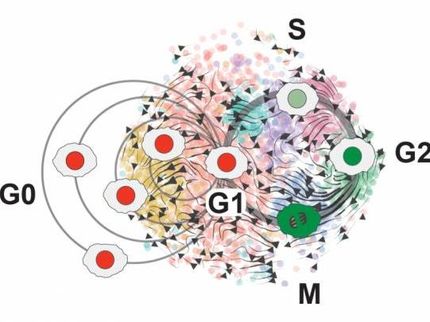Targeting a tumor trigger
Many cancer patients that receive chemotherapy go into remission at first, but relapse after treatment is discontinued. There is increasing evidence that this is due to the presence of cancer stem cells – cells that reproduce indefinitely and may seed new tumors. A research group from Milan, Italy, now devised a strategy to specifically target cancer stem cells in some cancers and reduce their tumor-generating potential.
Every tissue of our body has stem cells that continuously divide to replenish the body with new cells. In previous studies, the research team, headed by Pier Paolo Di Fiore and Salvatore Pece, investigated the role of a protein called Numb in maintaining stem cells in normal mammary gland development in mice. They found that Numb is required for cells to maintain the correct balance between stem cells and differentiated cells in the gland. Numb up-regulates p53, a protein that is known to arrest cell division. When Numb is lost, there is too little p53, resulting in more self-replicating stem cells. This may lead to the formation of tumors.
In many human breast cancers, Numb concentration is low and this is associated with a poor prognosis for the patients. In the present study, the researchers take a closer look at the role of Numb in these tumors. They find that tumors lacking Numb have increased numbers of cancer stem cells, thus providing the tumor with a higher potential to spread and grow. Moreover, the researchers found that p53 plays an essential role in this effect. When Numb concentration is low, p53 concentration will also drop. But when p53 levels are restored by blocking its degradation using a small chemical compound called Nutlin-3, the tumors are less aggressive and have fewer cancer stem cells. A number of drugs that target the p53 pathway, like Nutlin-3, are currently in clinical development.
Finally, the researchers tested the potential of combining Nutlin-3 and Paclitaxel, a common chemotherapy medication. While Paclitaxel treatment alone can lead to a decrease in tumor size, there is a large risk of relapse once the treatment is terminated. Combining Paclitaxel with Nutlin-3 not only potentiated the tumor response to Paclitaxel, but also prevented Numb-deficient tumors from re-growing after treatment discontinuation. This points to the potential of Nutlin-3 or similar drugs as treatment options to overcome chemoresistance due to cancer stem cells.
In the context of the current study, the researchers have developed a pre-clinical model system that specifically captures the impact of a treatment on cancer stem cells. All of their results are based on transplanting tumor cells from patients into mice and then using these mice in a variety of assays to investigate the presence of stem cells or the aggressiveness of the cancer. This system might be a valuable tool also in future experiments testing the impact of different compounds on cancer stem cells.
These pre-clinical findings suggest that breast cancer patients with a deficiency in Numb expression could become eligible for treatment with drugs similar to Nutlin-3 that are currently in clinical development. Exploiting the same pre-clinical model used for their studies, the researchers are testing the efficacy of this kind of drug candidates against cancer stem cells, and the possibility of identifying combination regimens with standard chemotherapies with minimized toxic effects, with the perspective of their possible application for the treatment of human breast cancer.
Original publication
Daniela Tosoni, Sarah Pambianco, Blanche Ekalle Soppo, Silvia Zecchini, Giovanni Bertalot, Giancarlo Pruneri, Giuseppe Viale, Pier Paolo Di Fiore and Salvatore Pece; "Pre-clinical validation of a selective anti-cancer stem cell therapy for Numb-deficient human breast cancers"; EMBO Molecular Medicine; 2017
Most read news
Original publication
Daniela Tosoni, Sarah Pambianco, Blanche Ekalle Soppo, Silvia Zecchini, Giovanni Bertalot, Giancarlo Pruneri, Giuseppe Viale, Pier Paolo Di Fiore and Salvatore Pece; "Pre-clinical validation of a selective anti-cancer stem cell therapy for Numb-deficient human breast cancers"; EMBO Molecular Medicine; 2017
Topics
Organizations
Other news from the department science

Get the life science industry in your inbox
By submitting this form you agree that LUMITOS AG will send you the newsletter(s) selected above by email. Your data will not be passed on to third parties. Your data will be stored and processed in accordance with our data protection regulations. LUMITOS may contact you by email for the purpose of advertising or market and opinion surveys. You can revoke your consent at any time without giving reasons to LUMITOS AG, Ernst-Augustin-Str. 2, 12489 Berlin, Germany or by e-mail at revoke@lumitos.com with effect for the future. In addition, each email contains a link to unsubscribe from the corresponding newsletter.





















































